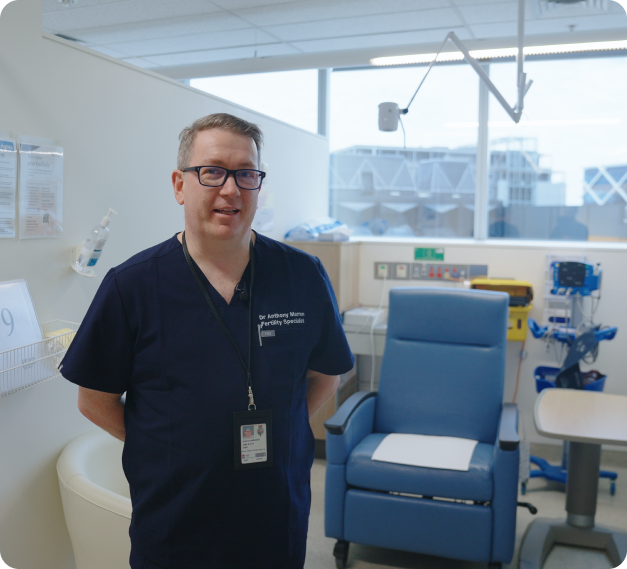
Understanding sperm DNA fragmentation is crucial in identifying hidden causes of infertility, particularly in couples facing unexplained infertility, recurrent implantation failure, or pregnancy loss. Testing for DNA fragmentation can provide valuable insights that help guide targeted treatment strategies.

From the time sperm start to be produced to the time sperm is released is a little under 3-months. In that time, sperm is exposed to heat and a variety of other toxins.
Heat and toxins can and will result in damage to the genetic material within the head of the sperm - DNA fragmentation.
When the sperm gets into the egg, the egg begins the process of DNA repair. However, if the DNA fragmentation is too great and/or egg quality is sub-optimal we see the following:


I usually request a sperm DNA fragmentation test on my patients. In the event DNA fragmentation is high, the following is performed:
Careful history looking for risk factors:

High sperm DNA fragmentation can impair natural conception and reduce success rates in ART, such as IVF and ICSI. Elevated DNA fragmentation is associated with poor embryo development (particularly from day 3 to 5), reduced implantation rates, and increased miscarriage risks.
Sperm DNA fragmentation is associated with an increased risk of recurrent pregnancy loss. Studies have shown that men with high levels of sperm DNA fragmentation are more likely to experience recurrent pregnancy loss.

Men with unexplained infertility should undergo sperm DNA fragmentation testing to identify potential underlying causes.
Men with varicocele, infections, and inflammation should undergo sperm DNA fragmentation testing to assess the impact on sperm DNA.

Antioxidant supplements, including vitamins C and E, zinc, and CoQ10, can reduce oxidative stress and enhance sperm DNA quality. These are often prescribed alongside lifestyle changes to maximise their effectiveness.
Reducing risk factors such as heat exposure, sedentary behavior, and smoking can significantly improve sperm DNA integrity. Regular ejaculation prevents the accumulation of older sperm that are more prone to DNA damage. Adjustments such as avoiding prolonged sitting, limiting sauna or hot bath use, and reducing the use of electronic devices near the pelvis are also recommended.
For men with varicocele, surgical correction (varicocelectomy) can improve sperm quality. In cases where no obvious cause of fragmentation is identified, further investigations such as testicular ultrasound may be required to rule out conditions like subclinical varicocele.
When conservative measures fail, ART techniques with advanced sperm selection methods, may be utilised to select the healthiest sperm. In severe cases where DNA fragmentation remains high, testicular sperm retrieval may be considered, as testicular sperm generally show lower levels of DNA damage compared to ejaculated sperm. This approach requires thorough counseling to ensure patients understand the implications and outcomes.

Manage lifestyle factors: Maintain a healthy weight, eat a balanced diet, and exercise regularly without overheating the testes.
Reduce heat exposure: Avoid prolonged sitting, saunas, and hot baths, and limit laptop use near the pelvis.
Quit smoking and vaping: Eliminate tobacco use to reduce oxidative stress.
Consider antioxidants: Consult a specialist about supplementing with vitamins C, E, zinc, and CoQ10.
Seek early intervention: Address medical conditions like varicocele or infections promptly to prevent further damage.

If you’re experiencing unexplained infertility, recurrent pregnancy loss, or concerns about your reproductive health, understanding the role of sperm DNA fragmentation could be key to finding a solution. I will guide you through testing and treatment options tailored to your needs, from lifestyle adjustments to advanced reproductive technologies. Don’t let uncertainty hold you back and book an appointment to take the first step toward understanding your fertility and exploring the best path forward for your family-building journey.
Oxidative stress, infections, smoking, advanced paternal age, and exposure to toxins can contribute to sperm DNA fragmentation.
A sperm DNA fragmentation assay (DFI test) is used to measure the integrity of sperm DNA.
Yes, high sperm DNA fragmentation is associated with lower fertilization rates, poor embryo quality, and increased miscarriage risk.
Lifestyle changes, antioxidant supplements, and medical interventions like varicocele repair can reduce DNA fragmentation.
In some cases, adopting a healthier lifestyle and treating underlying conditions can improve sperm DNA integrity.
A healthy diet, exercise, stress management, and avoiding smoking and alcohol can enhance sperm quality.
A DFI score below 15% is considered optimal, while higher levels may indicate fertility challenges.
Understanding the emotional journey couples endure when they have difficulty conceiving or recurrent pregnancy loss is essential to my approach.
Creative Advertising by Kiin Agency.